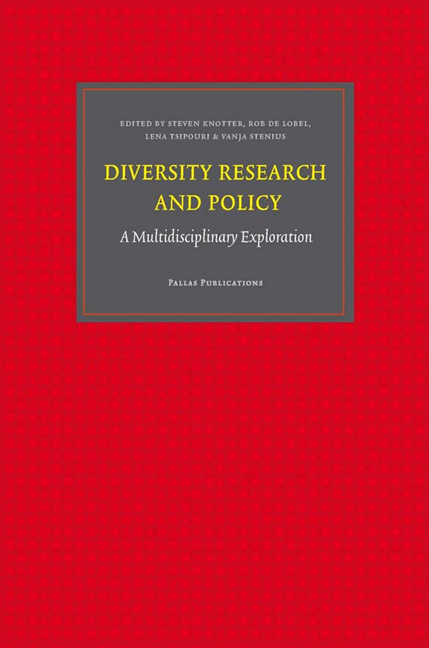Book contents
- Frontmatter
- Contents
- Acknowledgements
- 1 An Introduction
- 2 Diversity and Social Anthropology
- 3 Diversity and Sociology
- 4 Diversity and Criminology
- 5 Diversity and Ecology/Ecological Economics
- 6 Linguistic Diversity
- 7 Diversity and Architecture
- 8 Diversity and Urban Planning
- 9 Diversity and Economics
- 10 Diversity and Diversity Management in Business and Organisation Studies
- 11 Diversity and (Organisational) Psychology
- 12 Diversity and Law
- 13 Diversity and Public Policy
- 14 Conclusion
- About the Authors
- About the Reviewers
11 - Diversity and (Organisational) Psychology
Published online by Cambridge University Press: 15 January 2021
- Frontmatter
- Contents
- Acknowledgements
- 1 An Introduction
- 2 Diversity and Social Anthropology
- 3 Diversity and Sociology
- 4 Diversity and Criminology
- 5 Diversity and Ecology/Ecological Economics
- 6 Linguistic Diversity
- 7 Diversity and Architecture
- 8 Diversity and Urban Planning
- 9 Diversity and Economics
- 10 Diversity and Diversity Management in Business and Organisation Studies
- 11 Diversity and (Organisational) Psychology
- 12 Diversity and Law
- 13 Diversity and Public Policy
- 14 Conclusion
- About the Authors
- About the Reviewers
Summary
A Brief Description of the Discipline of Psychology
Work and organisational psychology is a branch of psychology focusing on the functioning of individuals and groups in organisations. In this field, psychologists analyse working individuals’ and workgroups’ behaviours, attitudes and performance. Additionally, they develop hiring practices, training programmes and feedback systems to improve people's performance. Work and organisational psychology can be divided into two broad areas of study, as evident in its name. Work psychology focuses on jobs and individuals’ prerequisites to perform well in their jobs. Therefore, job analysis is a major topic, as well as personnel selection, performance appraisal (how to evaluate individual effectiveness in jobs), and training and development (how to train workers to perform their jobs competently). Organisational psychology is comprised of topics related to individuals within organisational contexts. It focuses on leadership (e.g., how leaders influence workers) and interactions among group or team members. Here, the study of diversity has become pivotal in the recent past. Additionally, topics such as teamwork, worker motivation and job satisfaction are core aspects of organisational psychology.
The Meaning and Categorisation of Diversity in Psychology
Diversity in work and organisational psychology refers to “the distribution of differences among the members of a unit with respect to a common attribute, X, such as tenure, ethnicity, conscientiousness, task attitude, or pay” (Harrison & Klein 2007: 1200). Thus, diversity is a compositional construct that does not denote an individual's attributes but rather the dispersion of individuals’ attributes within a certain group. Given that diversity may relate to any characteristic, every work group is diverse, as all group members differ with regard to some aspects. According to the above-mentioned definition, it is not necessary that group members are aware of these differences. A more narrow definition of diversity includes this aspect, stating that from the group members’ point of view, a group is diverse if it is composed of individuals who differ on any characteristic on which they base their own social identity (O’Reilly, Williams & Barsade 1998: 186). Social identity refers to the part of an individual's identity deriving from their membership of certain groups (e.g., being a woman, a Muslim, an artist) as opposed to those parts of their identity resulting from their unique, individual characteristics (e.g., being conscientious).
- Type
- Chapter
- Information
- Diversity Research and PolicyA Multidisciplinary Exploration, pp. 181 - 190Publisher: Amsterdam University PressPrint publication year: 2012



